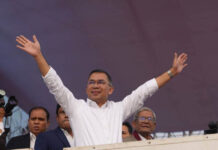Prime Minister Justin Trudeau’s leadership is under renewed scrutiny following a significant setback for Canada’s ruling Liberal Party. The party lost a traditionally safe seat in the Montreal parliamentary constituency of LaSalle-Emard-Verdun, with preliminary results released on Tuesday showing the separatist Bloc Quebecois candidate, Louis-Philippe Sauvé, securing the win. According to Elections Canada, Sauvé garnered 28% of the vote, narrowly beating Liberal candidate Laura Palestini, who received 27.2%. The New Democratic Party (NDP) candidate finished close behind with 26.1%. This election was held to replace a Liberal legislator who had recently stepped down.
The loss in Montreal, a city long considered a Liberal stronghold, is a significant blow to Trudeau’s party and comes at a time when his popularity is waning after nearly nine years in office. Although Trudeau has expressed his intention to lead the Liberals into the next federal election, which must be held by October 2025, this latest defeat has intensified calls for change within the party ranks. Some Liberal legislators have openly expressed their concerns, with Alexandra Mendes, a Liberal MP representing a Quebec constituency, stating that many of her constituents believe it is time for Trudeau to step down.
This result marks a stark contrast to the 2021 general election, where the Liberals won the LaSalle-Emard-Verdun seat with a comfortable 43% of the vote, well ahead of the Bloc Quebecois at 22% and the NDP at 19%. Trudeau had previously suggested that rising public anger over issues such as elevated prices and a housing crisis could impact voter sentiment.
Recent polls indicate that the Liberals are facing an uphill battle. A Leger poll conducted last week showed the right-of-centre Conservative Party, led by Pierre Poilievre, with 45% of public support—a level of national backing that is rarely seen in Canada. The Liberals trail significantly at 25%. Trudeau’s declining popularity is largely attributed to the public’s growing frustration over the cost of living and a housing crisis, partially driven by a surge in temporary residents, including foreign students and workers.
Conservative leader Pierre Poilievre has capitalized on these issues, pledging to eliminate the federal carbon tax, which he argues is contributing to the rising cost of living. Additionally, Poilievre has promised to cap immigration limits until more housing can be constructed. In response to his growing influence, the Liberals have aimed to portray Poilievre as a supporter of former U.S. President Donald Trump’s “Make America Great Again” movement, as they seek to distinguish their platform ahead of the upcoming election.
Poilievre, known for his abrasive political style and frequent criticisms of opponents, has also proposed defunding the Canadian Broadcasting Corporation (CBC). In April, he was ejected from the House of Commons after calling Prime Minister Trudeau “a wacko,” further intensifying the political rivalry between the two leaders.
The loss of the LaSalle-Emard-Verdun seat, along with mounting internal pressures and declining poll numbers, presents a significant challenge for Trudeau. As calls for a change in leadership grow louder, the Prime Minister faces an uphill battle to reinvigorate his party and restore voter confidence before the next federal election.








get generic clomid for sale buy generic clomiphene pill cost of clomiphene for men how can i get clomiphene pill clomid tablets clomiphene tablets price in pakistan how to buy clomiphene without dr prescription
This is the stripe of content I take advantage of reading.
More posts like this would force the blogosphere more useful.
azithromycin generic – buy zithromax 250mg without prescription flagyl usa
buy rybelsus online cheap – cost semaglutide 14 mg cyproheptadine cost
domperidone 10mg ca – order generic flexeril purchase cyclobenzaprine pills
augmentin 625mg oral – https://atbioinfo.com/ ampicillin price
buy generic nexium for sale – nexium to us buy nexium tablets
purchase medex online – blood thinner purchase cozaar pill
meloxicam 15mg drug – swelling buy meloxicam pills for sale
deltasone 20mg pills – https://apreplson.com/ buy prednisone 20mg for sale
best ed medications – https://fastedtotake.com/ erectile dysfunction medicines
buy amoxicillin paypal – comba moxi amoxicillin without prescription
buy diflucan 200mg online – https://gpdifluca.com/# buy fluconazole generic
order cenforce 50mg sale – https://cenforcers.com/# cenforce 50mg canada
cialis for daily use side effects – this cialis store in philippines
cialis 10 mg – where to buy liquid cialis cialis tablets for sell
order zantac online – https://aranitidine.com/# purchase ranitidine pills
viagra sale uk only – buy viagra no prescription canada buy viagra online
This website exceedingly has all of the information and facts I needed about this thesis and didn’t comprehend who to ask. https://gnolvade.com/
More text pieces like this would urge the web better. https://buyfastonl.com/amoxicillin.html
I couldn’t hold back commenting. Profoundly written! https://ursxdol.com/azithromycin-pill-online/
This is the description of glad I get high on reading. https://prohnrg.com/product/cytotec-online/
This is the tolerant of post I find helpful. https://aranitidine.com/fr/viagra-professional-100-mg/
This is the type of advise I recoup helpful. https://ondactone.com/simvastatin/
With thanks. Loads of conception!
order topamax 100mg without prescription
I’ll certainly bring to review more. http://forum.ttpforum.de/member.php?action=profile&uid=425017
forxiga medication – site dapagliflozin drug
xenical over the counter – purchase xenical for sale buy generic xenical 120mg
Greetings! Extremely serviceable suggestion within this article! It’s the scarcely changes which choice turn the largest changes. Thanks a a quantity towards sharing! http://www.predictive-datascience.com/forum/member.php?action=profile&uid=45977
You can conserve yourself and your stock close being cautious when buying medicine online. Some pharmaceutics websites function legally and put forward convenience, privacy, rate savings and safeguards as a replacement for purchasing medicines. buy in TerbinaPharmacy https://terbinafines.com/product/zantac.html zantac
I’ll certainly bring to review more. TerbinaPharmacy
I am in fact happy to glance at this blog posts which consists of tons of profitable facts, thanks object of providing such data.
Với giao diện mượt mà và ưu đãi hấp dẫn, MM88 là lựa chọn lý tưởng cho các tín đồ giải trí trực tuyến.
Tham gia cộng đồng game thủ tại Go88 để trải nghiệm các trò chơi bài, poker phổ biến nhất hiện nay.
Tham gia cộng đồng game thủ tại Go88 để trải nghiệm các trò chơi bài, poker phổ biến nhất hiện nay.
Khám phá thế giới giải trí trực tuyến đỉnh cao tại MM88, nơi mang đến những trải nghiệm cá cược thể thao và casino sống động.
online blackjack olga
live roulette online casino
besten online casinos
betmgm РњРћ betmgm-play betmgm TN